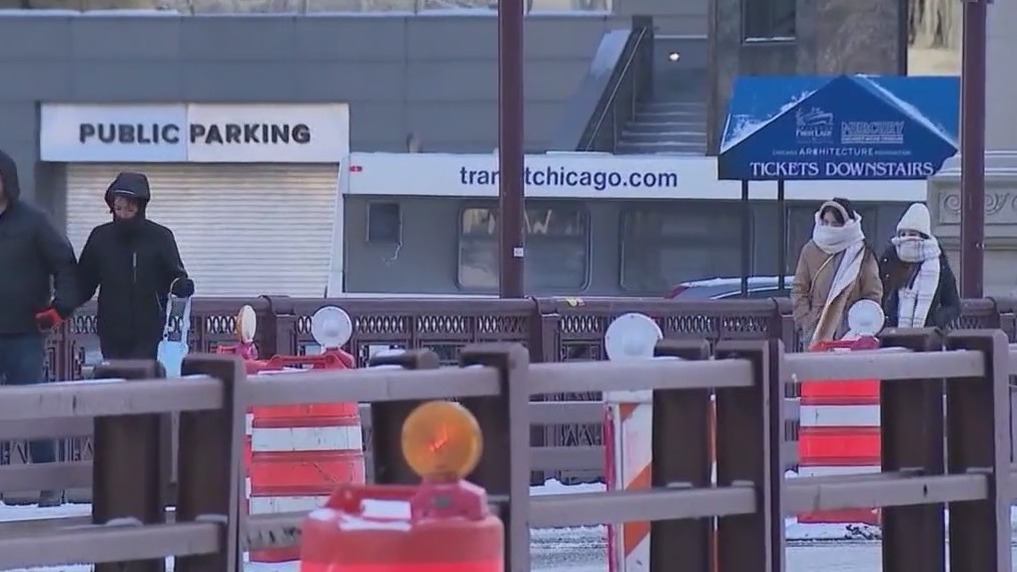Brutal cold claims four lives, but Chicago area hospitals don’t see rise in weather-related problems

6 cold-related deaths reported since Friday
The brutally cold weather in Chicago this week are being blamed for several deaths. The medical examiner says four people died from the cold in the past five days. The weather is suspected in two additional deaths reported in Will County.
CHICAGO - Four people died from the cold in the past five days — three on Friday and one Monday.
But area hospitals have not seen an unusual influx of patients suffering cold-related problems.
The people who died had pre-existing health conditions, and their secondary cause of death was listed as cold exposure, according to the Cook County Medical Examiner’s office.
James Arthur Jernigan, 81, of the 7600 block of South Phillips Avenue in Chicago, died at 10:07 a.m. Friday. His primary cause of death was hypertension and hardened arteries, but the coroner’s office listed "environmental cold exposure," as a possible secondary cause.
Police and paramedics were called to the building and found Jernigan unresponsive on the stairs of a back porch. He was transported to Trinity Hospital, where he was pronounced dead.
Robert James Tuxford, 62, died in the 10100 block of South Kostner Avenue in Oak Lawn at 12:52 p.m. Friday. The primary cause of death was hypertensive and atherosclerotic disease with a probable component of environmental cold exposure.
Richard Kellinger, 73, died in the 600 block of South Alpendorf Avenue in Streamwood at 11:50 p.m. on Friday. The primary cause of death was hypertensive and atherosclerotic disease. Secondary causes included diabetes mellitus, interstitial lung disease and hypothermia due to environmental cold exposure.
John Drygalski, 86, died in the 2200 block of North Harlem Avenue in Elmwood Park at 1:56 p.m. Monday. The cause of death was hypertensive and atherosclerotic disease with a secondary cause of environmental cold exposure.
Altogether, the Cook County Medical Examiner’s Office has recorded eight cold-related deaths since November. That is a typical, if slightly low, number of cold-related deaths for this time of year, said Natalia Derevyanny, the agency’s director of communications. In 2023, 13 cold-related deaths occurred before Jan. 17.
The Will County Medical Examiner's Office is also investigating two deaths that may have been caused due to dangerously cold temperatures.
Todd Tschiggrie, a 44-year-old Park Forest man, was pronounced deceased at 11:42 pm on Jan. 12 at Silver Cross Hospital in New Lenox after being found in a driveway in the 8400 block of Brookside Glen Drive in Tinley Park.
Craig M. Buckley, a 59-year-old Bolingbrook man, was pronounced deceased on Jan. 16 at 11:11 am in the 200 block of Coral Court in Bolingbrook, after being found outside.
Despite the deaths, Chicago hospitals have not seen notable increases in patients with cold-related injuries this week. Doctors attribute it to effective communication about cold-weather danger and people having the ability to work from home.
At Rush University Medical Center, patients have come in with heart-related concerns after last week’s storm, spokesperson Charles Jolie said. He attributed it to the heavy, wet snow.
"As Rush doctors have pointed out, when you get snow that heavy, the amount of exertion needed to remove a sidewalk full or a driveway full is surprisingly large," Jolie said. "For people who have existing heart issues or people who are elderly … it can result in tremendous strain on the heart."
Since Saturday, Northwestern Medicine has seen three cases of frostbite and two injuries due to falls on ice.
Cook County Health has seen fewer patients in recent days than its normal volume, said Dr. Trevor Lewis, chair of Emergency Medicine at the hospital system.
The main injuries residents should look out for in the current weather are frostbite, wrist injuries from slipping on ice, and hypothermia, he said.
Residents are encouraged to stay indoors as much as possible and bundle up when going outside to avoid weather-related injuries.
The Chicago area is also currently under a wind chill advisory until 9 a.m. Wednesday, the National Weather Service said, warning of wind chills as low as 30 degrees below zero. That can cause frostbite in as little as half an hour.
"If you start to feel things like numbness of your fingers, toes, nose, or pain, those are certainly signs of exposure or frostbite. Get inside into a warm environment," Lewis said.
The Cook County Health emergency care chief recommended wearing loose layers of clothing that provide warmth without causing sweat and to make sure footwear has good traction. Limiting outdoor activity whenever possible is also advised. He warned against touching metal to bare skin outside, which can cause the skin to instantly freeze.
"Be careful. Make sure you’re wearing gloves and hats. Really just minimize the exposure outside and kind of listen to your body," Lewis said.
Checking in on elderly relatives, neighbors or friends, is especially important during cold snaps, Lewis said. People who may not know who to reach out to for heating problems or advice on how protect themselves from the cold face increased risks.
"Their heat might not be working, their house might be getting very cold, and they maybe don’t know how to reach out or who to call for help," Lewis said. "It’s always important to check on those elderly friends and family who might be living by themselves."

